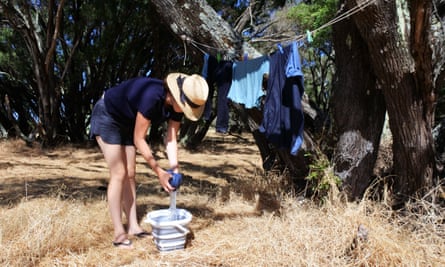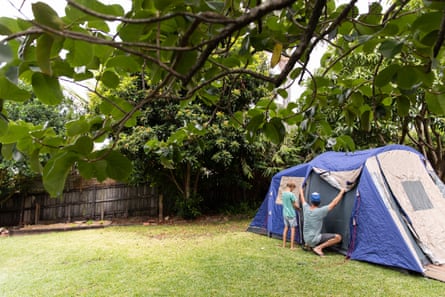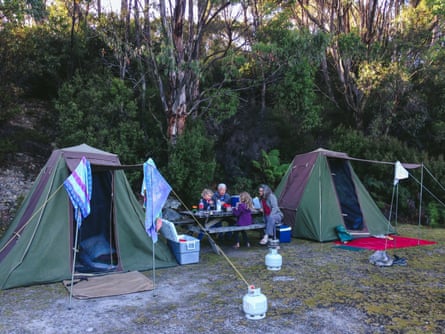
Tis the season to take a holiday, and in this cozzie-livs crisis, Australians are embracing camping as an alternative to pricier getaways. December data from Hipcamp Australia shows there has been a 47% year-on-year increase in campsite bookings by families with at least one child, a 58% year-on-year rise in bookings with five or more kids and a “surge in multi-family trips”.
But for first timers, pitching a tent with kids in tow can be complicated. We asked outdoors experts and seasoned happy campers for their top tips on a (nearly) seamless first camp in the great outdoors.
1. Pick easy equipment
As the coordinator of my family of five’s camping adventures, my husband James recommends packing as light and as practical as you can. “Sometimes it’s better to spend money on equipment that’s easy to set up, because there’s nothing worse than trying to set up a complicated tent with three kids running amok after they’ve been in a car for ages,” he says. He also recommends checking reviews on all equipment before purchasing, and buying a premade, camp-specific first aid kit which will have instructions for beginners in the event of an injury. “Make sure that equipment is season-appropriate too – not all sleeping bags can be used year-round, so consider a three-season sleeping bag that can be used in shoulder seasons.”
2. Pack familiarity, extra clothes – and wet wipes
Iesha Mulla, who describes herself as a “camping enthusiast” mum, says allowing kids to bring some comfort items, such as their favourite book or a soft toy, “helps them adjust to the new surroundings”. She says packing extra clothes is a must, too. “Kids tend to get dirty rather quickly when camping,” she says. “Extra socks, underwear and layers for warmth are crucial. And don’t forget the wet wipes!”
I’d add proper vomit bags to the list of essentials, to be kept in the car glove box.
3. Always bring buckets
It’s easy to get caught up in the bigger things, but thinking basic is essential. The team at Hipcamp suggest a portable potty “with an easy waste disposal system”. Even if your campsite has a toilet block, it could well come in handy on the road.
In addition to drinking water, bring plenty of buckets and containers of fresh water to wash hands, faces, plates and sandy feet.
4. Make a list, check it twice
Robyn, who regularly camps with her husband, three kids and four other families, keeps two lists on the kitchen counter with a pen in the week before they head out. On one, she writes down everything that needs to be done to the house before they leave (including switching off power points and shutting windows) and a list of the last-minute packing stuff they remember as they go (think extra batteries, torches, insect repellent). “When the car is completely packed and everyone is inside [ready to leave], get one parent to go back in the house and check both lists to ensure you have not forgotten any important items,” she says.

5. Practise in the back yard
If you have the space, try a back yard campout before hitting the road with your kids, Matthew New of Off-Grid Destinations suggests. “This familiarises them with sleeping in a tent and eases them into the camping experience. Incorporate as much of your camping equipment as possible: use lanterns or flashlights after dark, sit on camping chairs and use only camping gear for bedding to mimic the actual camping experience. [And] try cooking a meal outside, preferably on a portable stove or grill.”
6. Plan gear-free activities
“Turn the entire camping experience into a playful adventure,” says Daniel Espada of Gear Adventure. “Set up a scavenger hunt, tell campfire stories and stargaze together. Play interactive games like flashlight tag, nature bingo or storytelling contests.”
Relying on nature for activities such as bird watching or plant sketching helps to entertain and uses your surroundings or existing supplies so you don’t have to lug additional materials to keep kids entertained.
7. Group trips make for easy catering
“My biggest tip is to go with multiple families with kids of the same age,” Robyn says. “The kids form a tribe and the grown-ups can emotionally recuperate around the fire at night together. And split up the dinners between you all so everyone eats together, and you don’t have to worry about prepping a bunch of different meals, because everyone has their own allocated meal time to cook one thing for everyone.”
James says splitting equipment between families helps minimise packing too.
Meanwhile, the Hipcamp team suggest choosing food that “keeps and is easy” to make mealtimes simpler – such as sausages, bread, baked beans and apples.
8. Use the experience to teach life skills
Kirianna Poole, who documents her camping-in-a-Kombi adventures with her partner and three kids on Instagram, says enlisting children to help cook gives them purpose and aides in cultivating outdoor life skills and fire safety. “I let the kids stir pots over the fire when I’m nearby, but I always explain the different parts of a fire and where the most heat is found,” she says. “Building this knowledge and foundation helps them understand fire and its dangers. In turn, they learn to always respect it.” Plus, getting them to collect and stack firewood is fun, she says: “Like playing a big game of Jenga”.

9. Don’t overlook safety lessons
“Teach your children basic safety rules like staying within the campsite, recognising poisonous plants and the importance of staying hydrated,” New says. “Equip them with whistles and small flashlights.”
Mulla says it’s important kids “know the boundaries of your camping area” using natural markers such as a tall tree or a big rock, which in turn helps you manage their free rein in the outdoors.
10. Lower your expectations
“Let go of any standards of hygiene,” Robyn says. “Everyone will go to bed filthy and wake up filthy. Don’t look too closely at anyone’s feet.”
11. Take care of your surroundings
“Instil a love and respect for nature by teaching ‘leave no trace’ principles,” New says. “Encourage them to observe wildlife from a distance and to keep the campsite clean.”
12. Involve the kids in planning – and have a backup plan
“Let [your kids] help choose the [camping] location and plan activities,” New says. “This builds excitement and gives them a sense of ownership.” He also recommends making a backup plan. “Flexibility is key to a successful family camping trip. While having a plan is great, kids’ moods and interests can change rapidly, so be ready to adapt.”


